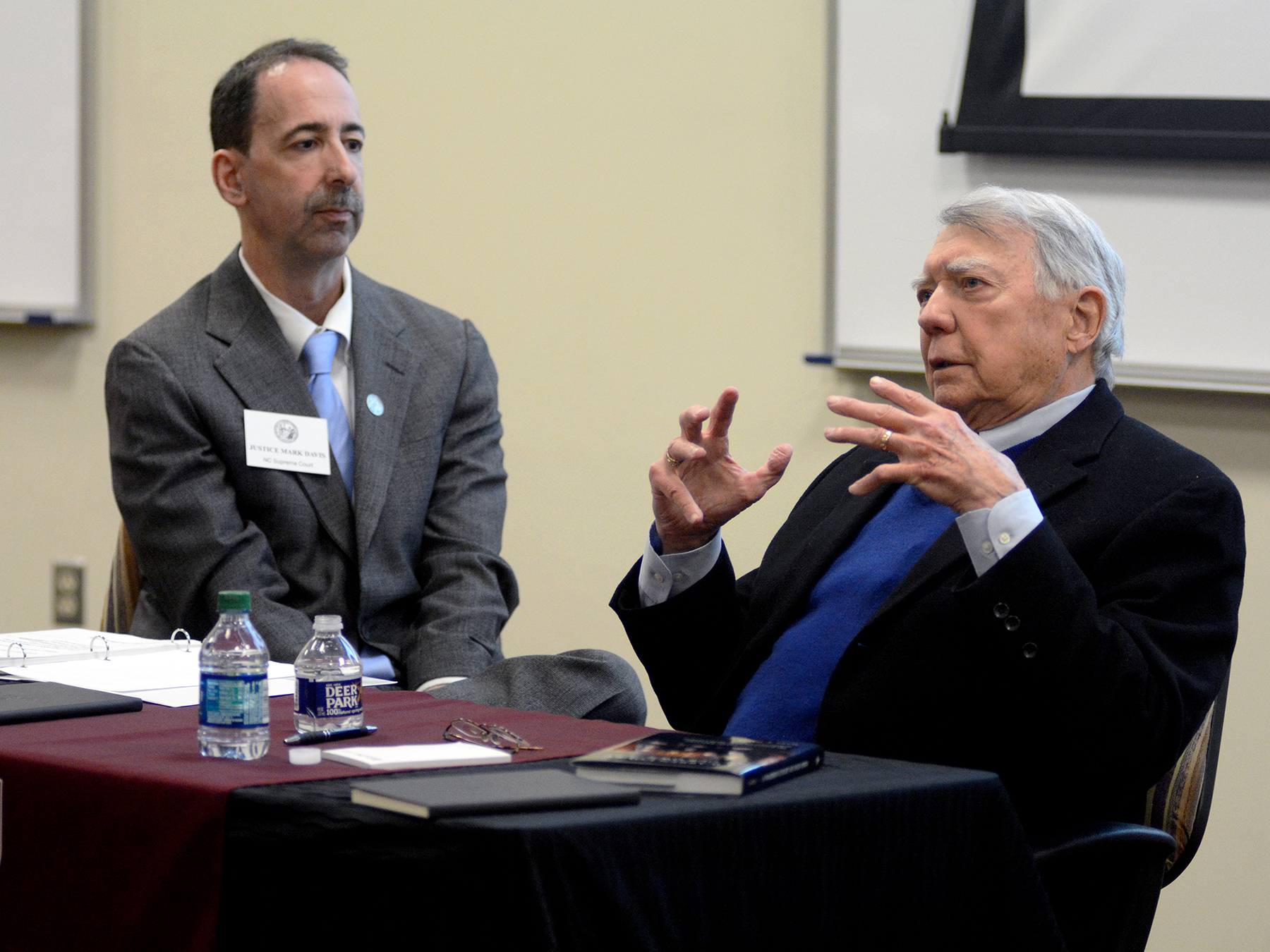Elon Law's Advocacy Fellows welcomed Associate Justice Mark Davis of the Supreme Court of North Carolina for a Tuesday program with retired Chief Justice James G. "Jim" Exum Jr., whose work in the state judiciary is featured in Davis' new book "A Warren Court of Our Own: The Exum Court and the Expansion of Individual Rights in North Carolina."
Jim Exum is personally opposed to capital punishment. He’ll tell you he not only believes it to be morally wrong but bad public policy.
So when you consider death penalty appeals as the chief justice of the Supreme Court of North Carolina, what are you to do? Follow the law, Exum said.
“My views on the death penalty were well known. It’s not something I tried to hide,” Exum said Tuesday while reflecting on his successful 1986 campaign for the state’s top judicial post. “Yes, I opposed the death penalty, but I don’t think it’s unconstitutional.”

And therein lies the role of a judge, Exum said. “None of us believed, and I still don’t believe, judges should have any kind of agenda,” he said. “We’re not politicians. We’re judges. We operate within certain parameters. We don’t choose our work. We don’t choose our cases. The cases are brought to us.”
Judges should not approach their roles with the idea of creating policy. However, he said, it is imperative that jurists consider the consequences of their rulings.
Exum’s remarks on January 21, 2020, were part of a wide-ranging conversation led by current state Supreme Court Associate Justice Mark Davis, author of the new book “A Warren Court of Our Own: The Exum Court and the Expansion of Individual Rights in North Carolina.”
The book demonstrates that despite judicial philosophy differences between several of the justices, during Exum’s tenure, the court issued numerous decisions expanding the rights of criminal defendants, “breathing new life into the declaration of liberties set out in the North Carolina Constitution, and significantly increasing the remedies available to individual plaintiffs in the areas of tort, employment, and workers’ compensation law.”

Exum and Davis were hosted by Elon Law’s Advocacy Fellows. The lunch hour program was standing-room only in Room 204 as Exum, with questions from Davis, shared with students, faculty, staff and community members stories from his career.
The book originated from Davis’ thesis in Duke University’s Master of Laws graduate program. Davis reviewed the Exum Court’s body of cases and conducted more than 45 interviews with surviving justices who served with Exum, law clerks, practitioners, and members of North Carolina’s legal academy, in addition to citing multiple primary documents and transcribed interviews from the era.
Exum, a Democrat, had served on the North Carolina Supreme Court for more than a decade when he was elected chief justice, a role he kept until retiring from the court in 1994. He soon returned to private practice at Smith Moore Leatherwood LLP, today known as Fox Rothschild LLP, where he led the appellate practice group. During his service with the Supreme Court, Exum wrote 402 opinions for the court and 208 concurring or dissenting opinions.

He is a founding member of the Elon University Law School Advisory Board and served as Distinguished Jurist-in-Residence at Elon Law from 2006 to 2012. He is the recipient of the North Carolina Bar Association’s Judge John J. Parker Award for conspicuous service to the cause of jurisprudence; the North Carolina ACLU’s Frank Porter Graham Civil Liberties Award and the American Judicature Society’s Herbert Harley Award for contributing to the improvement of the administration of justice in North Carolina.
“A Warren Court of Our Own: The Exum Court and the Expansion of Individual Rights in North Carolina” is available for purchase through Carolina Academic Press. Said Exum of the book: “He’s crafted the book in such a way that it’s very readable and open to the average person.”



